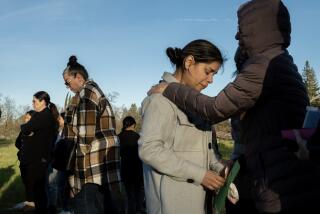Caro Screams, Sobs at Testimony About Blood
- Share via
Socorro Caro shrieked and erupted in uncontrollable sobs Monday during technical testimony about the blood that spattered two of the young sons she is accused of killing.
A bailiff and one of Caro’s attorneys rushed to wheel the screaming woman, who was huddled in an office chair at the defense table, into a side room.
Caro’s outburst before the jury prompted the judge to clear the courtroom and warn her attorneys that he’d have to take action if it happens again. He acknowledged, however, that he did not know what he’d do if the Santa Rosa Valley woman accused in the shooting deaths of three of her four boys loses control again.
Caro is charged with three counts of first-degree murder and has pleaded not guilty and not guilty by reason of insanity.
Her outburst was the second during her trial, which began Aug. 22 and could last well into the fall. Her prior emotional display occurred at the start of an afternoon break, when the jury wasn’t present.
On Monday, it came as Ed Jones, a forensic scientist for the Ventura County Sheriff’s Department, testified about the patterns of blood droplets found in and near the bunk bed that was shared by Michael Caro, 8, and his 5-year-old brother, Christopher. Joey, 11, was found dead in a separate room on the night of Nov. 22, 1999, and Socorro Caro was discovered on her bedroom floor with a bullet wound to the brain. A fourth son, Gabriel, 13 months old at the time, was unharmed.
Jones’ dry and clinical testimony was laden with scientific allusions to “the directionality” of flying blood and references to “blood spatter events”--in this case, the point-blank shootings of the three children.
A 6-foot-by-6-foot image of Michael and Christopher, dead in the lower berth of their bunk bed, was projected onto the courtroom wall. Their eyes are half-open, and their pillows, blankets and Winnie the Pooh sheets are soaked with blood. It was a sight Caro had seen a number of times in the trial; usually, however, she averts her eyes and sobs quietly, burrowing into the shoulder of Deputy Public Defender Nicholas Beeson.
Jones stood before the photo with a pointer, as a prosecutor asked where the blood that showered Michael’s face may have come from. At that point, Caro’s loud moan turned into a pained, prolonged shout and she was taken from the courtroom. When testimony resumed, Jones said the blood that spattered onto Michael’s face had burst from the head of his younger brother.
When Caro returned, Ventura Superior Court Judge Donald D. Coleman told her to restrain herself.
“I know you’re trying hard,” he said, “and I just ask that you try harder to avoid this kind of conduct.”
Earlier, her lead attorney, Assistant Public Defender Jean Farley, had apologized to the judge for the incident, saying the defense team has worked hard to prepare Caro for the trial’s emotional rigors. She said the children’s personal things--their bedding, their books, their toys--tend to upset her client more than medical or police testimony about the crimes.
Caro maintained her composure for the rest of the day, despite graphic testimony from Assistant Chief Medical Examiner Janice Frank about the autopsies she performed on the Caro boys.
Frank’s testimony was illustrated with autopsy photos and child-size foam mannequins. The mannequins’ heads were pierced with thin metal rods indicating bullet paths. She testified that the boys were shot with a gun held “snugly” to their heads. Christopher was shot in the head twice, at roughly the same place, she said.
If Caro loses her composure again, the judge can exercise a range of options, said Laurie Levenson, a former federal prosecutor who teaches at Loyola University law school in Los Angeles. In a few celebrated cases--the trials of Charles Manson and the Chicago 7 among them--judges have gagged and bound unruly defendants.
More commonly, judges simply have defendants removed from the courtroom, and attorneys can ask that their clients waive their right to be present. At a murder trial, that can cut both ways, Levenson said.
“It can be seen as indifference,” she said, “but on the other hand, defense attorneys can argue that it’s simply too painful for a client to be there.”
More to Read
Sign up for Essential California
The most important California stories and recommendations in your inbox every morning.
You may occasionally receive promotional content from the Los Angeles Times.














